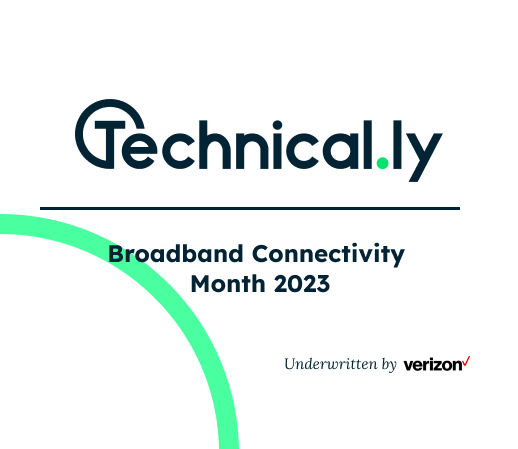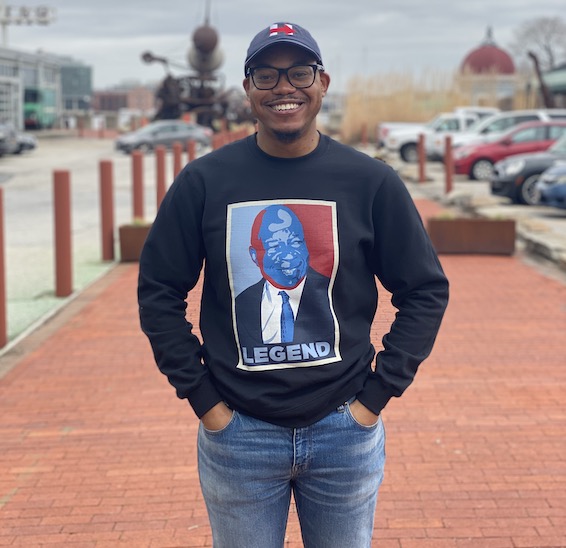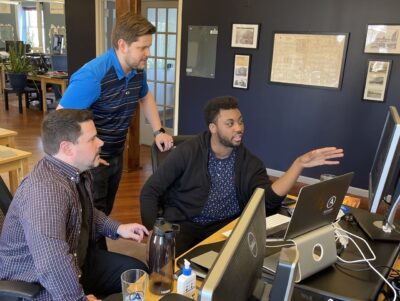
This editorial article is a part of Broadband Connectivity Month of Technical.ly's editorial calendar, underwritten by Verizon. Verizon is a Technical.ly Ecosystem Builder client.
A quick perusal of Cody Dorsey’s LinkedIn profile quickly reveals his experience with advocacy, problem-solving, policy analysis and relationship-building — all crucial skills for spearheading efforts to bridge the digital divide in Baltimore.
The executive director of the Baltimore Digital Equity Coalition (BDEC) successfully expanded the coalition from 50 diverse organizations citywide to nearly 100 during his continued tenure.
Key concerns like improving device access, enhancing internet connectivity and driving advocacy efforts consistently take center stage for this self-proclaimed “digital navigator.” Dorsey firmly believes that such a role is essential in a city like Baltimore, where studies indicate 40% of the households lack broadband internet access, and one out of every three households doesn’t possess a desktop or laptop computer.
This approach underscores Dorsey’s belief in the importance of closing the digital divide in a city where access to broadband internet and devices remains a critical challenge.
“We established the city’s first-ever tech support help desk,” Dorsey said. “And we employed interns from the digital skills training provider — so that’s NPower, Pass IT On, Byte Back, Per Scholas.”
Dorsey also referenced Dell Technologies’ contribution of 1,000 Chromebook devices in 2022. These devices were distributed to students ranging from preschool to 12th grade as part of the Enoch Pratt Free Library’s initiatives. They were given out not only in libraries but also in barbershops, boxing gyms and salons.
“We made the difficult decision to close our help desk down, but I’m really proud to share with you that NPower has a help desk and the University of Maryland Extension has a helpline,” he added. “So [if] people need help with technology and they need technical assistance, they can call those two help desks and hotlines, respectively.”
He added that these resources serve as lifelines for individuals seeking technical support.
“We know that it’s a need, and that’s a form of digital navigation,” he said. “Everyone’s talking about digital navigating now, and being able to call someone is a form of navigation.”
Dorsey offered more insights on closing Baltimore’s digital divide in a conversation with Technical.ly. This interview has been edited for length and clarity.
Could you provide an overview of the Baltimore Digital Equity Coalition’s recent achievements and initiatives?
We transitioned to doing coalition-building for advocacy to make sure that Baltimore City gets its fair share. And some of the things that I’m really proud of that we’ve done this year [included] Maryland Digital Equity Day — first state in the nation to have a digital equity day. We hosted the [Federal Communications Commission’s] Task Force to Prevent Digital Discrimination here in Baltimore, which shows that Baltimore is leading on this issue. I’m looking forward to what’s next, and just educating our decision-makers on the state of the digital divide. So, actually informing our policymakers how it impacts their districts. … We had that Maryland Digital Equity Index Scorecard map that you can put a zip code in it and it shows the level of disconnectivity and those other things that may correlate with it. Those are important resources that we need to help educate folks on where we stand — not just as a community or city, but as a state as well. That’s a statewide map. So I see us really being a resource for those who are making decisions and keeping this issue, especially post-pandemic, at the forefront of everyone’s mind, considering that so much federal funding is coming down the pipeline to help address this issue. This is a once-in-a-generation, once-in-a-lifetime type of funding that’s coming down.
What is the Affordable Connectivity Program (ACP) benefit and why is its extension crucial?
[The] ACP benefit is $30 per month. Maryland adds an additional $15 a month for those who are eligible. We’re the only state in the nation to do it, and we need to urge Congress to extend the ACP benefit because so many of our communities are in need of that assistance. … This is not just about internet connectivity. It’s about connectivity of economic opportunity. The internet can really open up a world of resources. And I just sent something out to the BDEC community, to our members: Last night, we just recognized the 60th anniversary of the March on Washington. Congressman John Lewis, before he passed, he called internet connectivity the civil rights issue of the 21st century. That’s how important this is, because of the world we live in.
How has the coalition adapted amid evolving technology and concerns around AI?
I don’t hear a lot of people say this, but that’s really a literacy and skills issue. How knowledgeable are people in determining what’s real and what’s fake? So we certainly need to study the evolution of the use of AI. AI’s been used for a very long time, and tech used for good is a great thing. But we have to take into consideration those bad actors who use technology to scam people or to produce fake news and misinformation. I see our coalition playing a big role in this issue because it is a skills and literacy issue as it relates to the digital age.
How would you assess further efforts outside of the coalition?
We just need everybody to be a digital navigator. We need Alanah to be a digital navigator. If you know something about ACP, and you meet somebody who qualifies for it, hopefully, you can share the information about ACP. … Word of mouth plays a big role in a lot of the work that’s happening. So yeah, that extends to [the] Bmore Connected campaign, which aims to bring awareness to ACP. That’s the city’s campaign in partnership with Wide Angle and EducationSuperHighway. Gov. Moore has established his own public awareness campaign in partnership with EducationSuperHighway on this issue. … There’s a world of difference than where we were a year ago. We need our public officials to champion this issue. So you see, with our new governor, he came in and one of the bills he introduced was, then, the Broadband Expansion Incentive Act of 2023, because he wanted to expand broadband access. He has the ACP public awareness campaign. He just made the announcement about [Broadband, Equity, Access and Deployment program] funding. There’s momentum in leadership saying that this is a priority for them.
Before you go...
Please consider supporting Technical.ly to keep our independent journalism strong. Unlike most business-focused media outlets, we don’t have a paywall. Instead, we count on your personal and organizational support.
3 ways to support our work:- Contribute to the Journalism Fund. Charitable giving ensures our information remains free and accessible for residents to discover workforce programs and entrepreneurship pathways. This includes philanthropic grants and individual tax-deductible donations from readers like you.
- Use our Preferred Partners. Our directory of vetted providers offers high-quality recommendations for services our readers need, and each referral supports our journalism.
- Use our services. If you need entrepreneurs and tech leaders to buy your services, are seeking technologists to hire or want more professionals to know about your ecosystem, Technical.ly has the biggest and most engaged audience in the mid-Atlantic. We help companies tell their stories and answer big questions to meet and serve our community.
Join the conversation!
Find news, events, jobs and people who share your interests on Technical.ly's open community Slack







